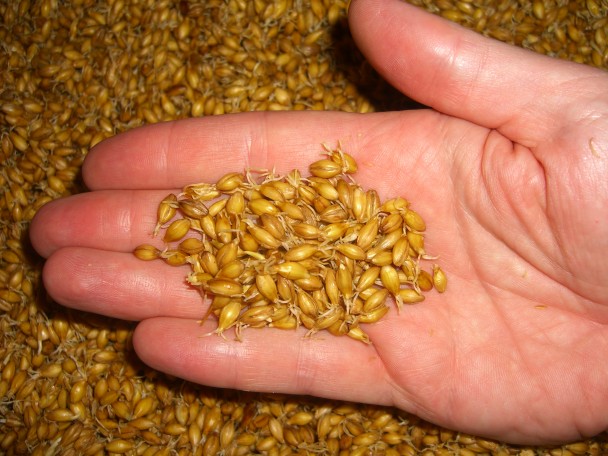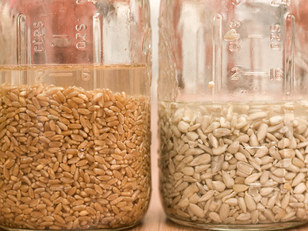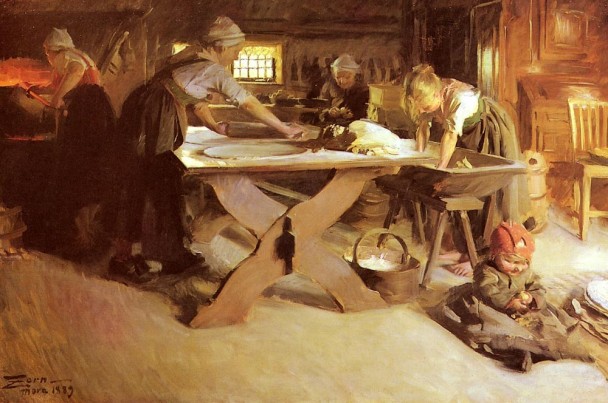Over the years, we’ve learned so much that makes our modern lives wonderful but we’ve lost some great traditions too. Traditions that would make us healthier and simplify life. These 3 ancient traditions are not secrets but how to use them is somewhat of a lost art so we’re hoping to help others put them into practice.
As much as we all love a good piece of toast, it’s no secret that grain isn’t always easy on our digestive systems. Dr. David Perlmutter, MD., believes that we should nearly cut all grain from our diets. Although his science is compelling, cutting grains would eliminate some of the most important nutrients that our bodies need.
That’s why our choice of grain is so important today. Einkorn is easier to digest and more nutritious, which is why we love it so much (not to mention the delicious flavor).
Yes, grain does do some really good things for our health. If only there were a way to get the benefits without the assault on our digestive systems. Oh, there is. Besides the type of grain we choose, there are some very cool (and even ancient) methods for giving our breads a health boost.

Dr. Weston A. Price
Photo Copyright © Price-Pottenger Nutrition Foundation®, All Rights Reserved, www.ppnf.org
Dr. Price found that these groups of people – across the board – prepared their with grains in one of the following ways: Natural Leavening (sourdough), Sprouting, and Soaking. The following information is an introduction to each method. We’ll be doing a series of posts with more detail about each method, including the health benefits and how-to information.
Tip #1: NATURAL LEAVENING
![IMG_1184[1]](https://www.einkorn.com/wp-content/uploads/2015/01/IMG_11841-608x456.jpg) As you probably g
As you probably g![IMG_1239[1]](https://www.einkorn.com/wp-content/uploads/2015/01/IMG_12391-608x456.jpg) uessed, this is referring to sourdough, also known as natural fermentation or natural leavening. Sourdough is a bread that rises without the use of packaged yeast. You’re probably aware that the way this works is the bread dough undergoes a fermentation that causes it to rise. It begins with a start that is fed and ferments. Then it can be used leaving a little behind to be fed and used again. There are many health benefits to natural leaven. Watch for the follow up post for a more in-depth look at this ancient techinque. Here are a couple brief reasons why we should consider natural leavening (More to come).
uessed, this is referring to sourdough, also known as natural fermentation or natural leavening. Sourdough is a bread that rises without the use of packaged yeast. You’re probably aware that the way this works is the bread dough undergoes a fermentation that causes it to rise. It begins with a start that is fed and ferments. Then it can be used leaving a little behind to be fed and used again. There are many health benefits to natural leaven. Watch for the follow up post for a more in-depth look at this ancient techinque. Here are a couple brief reasons why we should consider natural leavening (More to come).
Digestion
Natural leavening makes wheat much easier to digest because the fermentation begins the digestion process before it ever hits the mouth.
Nutrients
Natural leavening enables nutrient absorption in the body. The phytic acid is broken down so that our bodies are better able to absorb the nutrients found in grains.
Tip #2: SPROUTING
 As we know, grains are seeds that have the ability to develop new growth. There are protections in grains that keep them from growing until conditions are perfect. If we provide those conditions, grains will crack open and begin to sprout. Here is where we stop the process and use the grain as we usually do. Again, you may be asking, “Why would we do that?” Sprouting also has some great health benefits that improve the track record of the grains that make up such a large part of our diets.
As we know, grains are seeds that have the ability to develop new growth. There are protections in grains that keep them from growing until conditions are perfect. If we provide those conditions, grains will crack open and begin to sprout. Here is where we stop the process and use the grain as we usually do. Again, you may be asking, “Why would we do that?” Sprouting also has some great health benefits that improve the track record of the grains that make up such a large part of our diets.
Digestion
Grains that are barely on their way to becoming a new plant are easier to digest. It makes sense considering that the toughness is being broken down in favor of a new, tender plant.
Nutrients
Catching a plant at this stage means catching all the nutrients necessary for growth. Not only that, the process makes those nutrients more accessible for our bodies. Another important factor is that there are many nutrients that aren’t available in grains until they germinate. An important one is vitamin C.
For a list of studies done on the health benefits of sprouting go here.
Tip #3: SOAKING
 Soaking is another process that improves the healthiness of grains. This provides the conditions for germination that alters the grain enough to make it better for our bodies. Grains can be soaked in water or water mixed with things like salt or something acidic like yogurt, whey or lemon juice. Again, why?
Soaking is another process that improves the healthiness of grains. This provides the conditions for germination that alters the grain enough to make it better for our bodies. Grains can be soaked in water or water mixed with things like salt or something acidic like yogurt, whey or lemon juice. Again, why?
Digestion
Soaking breaks down gluten which is one of our digestive system’s main enemies. It’s another example of how we partially digest the grain before consuming it. It also has the power to neutralize toxins that clutter our colons.
Nutrients
Soaking is another way that phytic acid can be broken down so that our bodies are able to have full access to the nutrients found in grains.Also, this process that directs the grain towards germination facilitates the creation of enzymes, vitamins, and minerals that our body needs to function properly.
CONCLUSION
We use these methods in our family – some more than others. In fact, they are a regular way of life for us now but it took research, mentoring, and practice to get to this point. We hope our series of posts on this topic in the coming weeks will be helpful for any of you who are hoping to do the same.
We know that some of you are experts with these methods. Please share your feedback and ideas in the comments below. If you’d like to do a guest post to share your experience, we’d welcome the opportunity to have post on our website as a guest author. Just contact us to begin the discussion (we’ll make it worth your time).
Related Posts About Ancient Traditions:
Naturally Leavened Sourdough Bread Recipe & Tutorial
References
“The Benefits of Soaking Nuts and Seeds.” Food Matters. Permacology Productions. Web. 10 Jan. 2015.
Fallon, Sally, and Mary G. Enig. Nourishing Traditions. Washington, DC: NewTrends, 2001.
Perlmutter, David, and Kristin Loberg. Grain Brain. New York: Little, Brown and Company, 2013.
“Sourdough Bread Has Most Health Benefits Prof Finds.” University of Guelph. Web. 10 Jan, 2015.
“Sprouted Whole Grains.” The Whole Grains Council. Oldways. Web. 10 Jan. 2015.
Whitley, Andrew. “In Praise of Sourdough.” NYR Natural News. Neal’s Yard Remedies, 5 Sep. 2003. Web. 10 Jan. 2015.
Top image of women baking is used on this website under public domain rights.


Do you have recipes for sprouted-fermented bread or just the sourdough recipe which uses flour?
I have heard that the “modern” industrial breadmaking process is a huge cause of the modern coeliac disease epidemic, and that bread made “the old way” can actually be feed to coeliac sufferers with no ill effects.
Macsen, it’s true that modern techniques do contribute to many people’s digestive issues. I would be hesitant to say that celiac patients are fine to eat modern wheat as long as it’s sourdough, sprouted or soaked. However, those methods will definitely improve digestion and nutrient bioavailability. Using einkorn with these methods helps even more because the gluten is different and it’s already easier to digest. Add sprouting, soaking, or sourdough on top of that and the effect is powerful. People with wheat sensitivities should definitely try using these methods. I would recommend full-blown celiac patients talk to their doctors first.
Please don’t recommend that any Celiac or someone with Non Celiac Gluten Sensitivity or Wheat/Barley/Rye allergies even try anything with Einkorn, no matter how it was produced. People have been sued over this and one man who was fooling people with fake gluten free bread went to jail. Fooling someone into trying food that could damage them can lead to serious legal problems if they are injured. https://www.beyondceliac.org/celiac-news/fraudulent-gluten-free-goods/
These methods are very good and can produce wonderful gluten free foods from grains that a Celiac can eat (teff, sorghum, millet, rice, etc). There’s no need to risk someone’s health for a home experiment on whether these techniques can render gluten safe. They can’t. Lab studies have shown they can’t. Nothing will remove or make safe the gluten that’s already in something.
If someone is missing bread because they must be gluten free now, there are lots of easy flatbread recipes that can hold them over until they make their own brown rice or teff sourdough and learn to make their own bread. It’s cheaper and safer than store bought, and uses these heritage methods. Stay safe.
Hi Angelica, it’s true that care is needed. We always recommend that people who struggle with Celiac disease consult with their doctor before trying einkorn, and we are careful not to guarantee that any one can handle einkorn. We do not market einkorn as gluten free because it isn’t, but it is true that the gluten in einkorn is very different from the gluten in modern wheat, and that’s what we say. We have customers come back again and again so excited that they can eat einkorn with no problems. We have many customers dissatisfied enough with gluten free breads that they choose to take the risk to see if they can handle einkorn. We’ve never heard from anyone that they can’t. That is just anecdotal evidence and we don’t present it as anything else. We can’t guarantee that everyone can eat einkorn and don’t try, but this we know. 1. The gluten in einkorn is not the same as in modern wheat. 2. We have had an overwhelming response from customers with a range of gluten issues who have no adverse affects from eating einkorn. Those are the only claims we make and people interested can choose to try it or not. We appreciate your comment and concern. Let me know if you have any questions.
She did recommend above that anyone with celiac should talk to their doc first. I have non-celiac gluten sensitivity and I do experiment occasionally to see what I can handle well and cannot. I make organic, sprouted sourdough for my family with several kinds of flours like emmer, spelt, whole wheat, einkorn, etc. and have found that I can tolerate all of these as long as they’re prepared with souring. There is some truth to what she says above. However, not having celiac disease I am not risking my life or severe consequences, just migraines and digestive problems.
I am trying to figure out if it would work to make a bread with natural leavening AND sprouted grains, with no regular flour or grains in them?
Hi Stephanie, it would be worth a try. Once sprouted grains are dehydrated they grind up like regular flour. You would need to watch consistency and we have not tried it, but we would love to hear how it goes.
I make sourdough with sprouted wheat or spelt flours. It works beautifully.